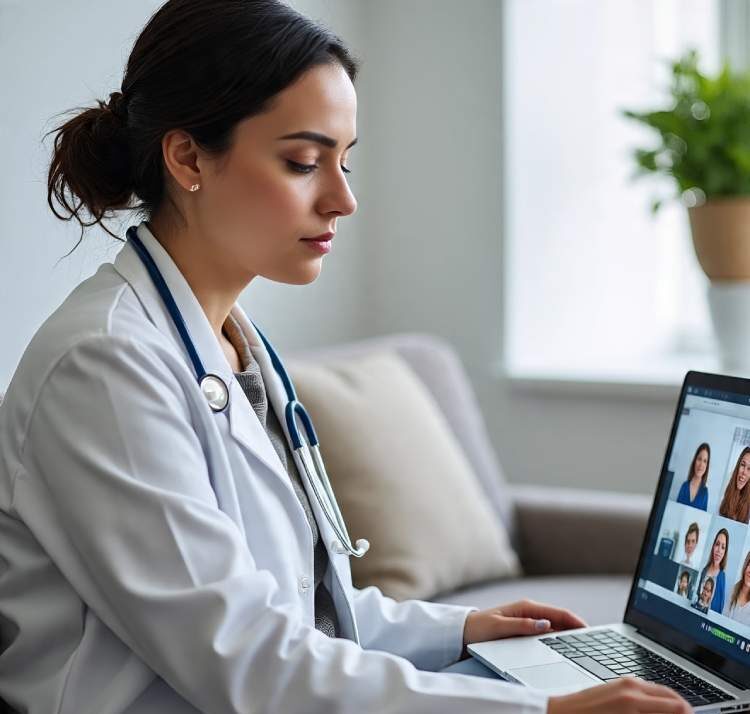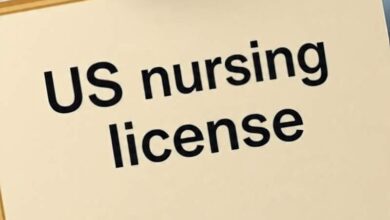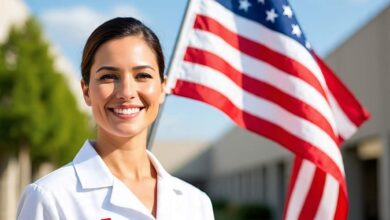How to Easily Get and Use Your Multistate Nursing License Through the NLC in 2025 (Avoid Costly Mistakes)
https://realnursingjourney.com/how-to-get-a-multistate-nursing-license-through-the-nurse-licensure-compact-nlc-in-2025/

Here’s How to Handle Your License Under the NLC in 2025
Understanding How to Easily Get and Use Your Multistate Nursing License Through the NLC in 2025 is crucial when relocating. Whether you’re moving for work, school, family, or military orders, follow the correct process based on where you’re moving from and to.
Scenario 1: Non-Compact State → Compact State
Example: You’re moving from Oregon to Idaho.
Steps:
-
Apply for Idaho licensure by endorsement.
-
Declare Idaho as your primary state of residence (PSOR).
-
Complete a background check and meet Uniform Licensure Requirements (ULRs).
Once approved, you’ll be issued a multistate license valid in all NLC member states—a huge upgrade from your Oregon single-state license.
You can let your Oregon license expire unless you plan to maintain it for future work.
Scenario 2: Compact State → Non-Compact State
Example: You move from Missouri to California.
Steps:
-
Apply for California licensure by endorsement (no multistate privileges in CA).
-
Once you establish CA residency, your multistate license becomes inactive.
You cannot legally practice in California using your Missouri license, and you also lose the ability to use it as a multistate license elsewhere unless you maintain a residence in a compact state.
Many nurses choose to keep their old license active as a single-state license for telehealth or temporary work back home—but it no longer grants compact privileges if your residence is in a non-compact state.
Scenario 3: Compact State → Compact State
Example: You move from Georgia to North Carolina.
Under the 2024 NLC rule, you must:
-
Apply for North Carolina licensure by endorsement.
-
Declare NC as your new PSOR.
-
Do this within 60 days of your move.
Scenario 4: Military Spouses & Temporary Moves
Military families benefit significantly from the NLC. If you’re a nurse married to an active-duty service member:
-
You can immediately practice in your new state (if compact) under your current multistate license.
-
Most states offer expedited processing for military spouses moving under orders.
-
If you move to a non-compact state, you must still apply traditionally—but many states fast-track military families.
The NLC eliminates much of the licensing friction military nurses face when frequently relocating.
Key Reminders When Moving

-
Always update your address with both your old and new Board of Nursing.
-
If your new state hasn’t implemented the compact yet, you’ll need to get a standard license for now—but stay informed. If/when your new state joins the NLC, you may automatically gain multistate privileges or be offered a quick path to upgrade.
-
Boards often post updates on NLC transitions—watch for announcements and emails regarding opt-in procedures, background checks, or license conversion.
Benefits of the NLC in 2025: Why Every Nurse Should Consider a Multistate License
Understanding how to get a multistate nursing license through the Nurse Licensure Compact (NLC) in 2025 isn’t just about paperwork—it’s about unlocking major professional and practical advantages. The NLC brings sweeping benefits for nurses, healthcare facilities, and, most importantly, patients. Below are the key ways a compact license can enhance your career and impact healthcare delivery across the U.S.
Expanded Job Opportunities Across the U.S.
A multistate license lets you apply for jobs in any compact state instantly—no need to apply for multiple licenses or wait for approvals. This is especially valuable for:
-
Travel nurses accepting short-term assignments across state lines
-
Float pool RNs in multi-state health systems
-
Nurses living near state borders (e.g., Kansas City, Kansas ↔ Missouri)
With a compact license, you can work legally and seamlessly in over 40 states. This flexibility also boosts your earning potential, allowing you to pursue the highest-paying or most convenient opportunities without being locked into your home state.
Save Time and Money on Licensing
Licensing costs can pile up quickly. Every additional state license typically requires:
-
Application fees
-
Fingerprints or background checks
-
License verifications
-
Continuing education (CE) compliance
-
Periodic renewals
With an NLC license, you only manage one license through your primary state of residence. This consolidation can save hundreds or even thousands of dollars over your career—plus countless hours in administrative hassle.
Ideal for Remote Nursing & Telehealth Work
The rise of telehealth means many nurses now serve patients far beyond their zip code. If you’re involved in:
-
Telephone triage
-
Remote chronic care management
-
Telehealth education or case management
-
TeleICU, hospice coordination, or health coaching
…then having a compact license is essential. It allows you to legally provide care to patients in any other NLC state. For example, a nurse based in Missouri can legally deliver telehealth services to patients in Arkansas, Iowa, or any other compact state—no extra paperwork required.
Faster Disaster Response and Emergency Staffing

The NLC empowers states to mobilize nursing help fast during emergencies. Whether it’s a natural disaster, pandemic surge, or mass casualty incident, nurses with multistate licenses can cross borders and start working immediately.
This eliminates the need for temporary waivers or red tape. We saw this in action during COVID-19—and the NLC now ensures this flexibility is built-in and ready year-round.
Smooth Transitions During Relocations
Whether you’re relocating for family, work, or as a military spouse, the NLC drastically reduces license disruption. Nurses no longer need to pause their career every time they move. With a compact license:
-
You apply for a new license once per move (if needed)
-
You can continue working right away in most cases
-
You avoid re-doing CE or paying extra fees in every new location
Military spouses especially benefit from this streamlined process—and so do civilian nurses looking for flexibility in where they live and work.
Help Alleviate the National Nurse Shortage
Many states are facing critical nurse shortages. The NLC allows facilities in those states to tap into a larger pool of available nurses quickly.
For example, hospitals in Washington, Utah, or North Carolina can now hire nurses from Texas, Florida, or Ohio without delay. This not only supports better staffing but also enhances care delivery in underserved or rural regions.
Improve Patient Access in Rural and Underserved Areas
The NLC enables nurses to serve patients in rural areas, even when they live in another state. Examples include:
-
Telehealth services for patients in isolated communities
-
Temporary staffing in small hospitals
-
Home health coverage across state borders
This flexibility improves healthcare access for populations who often struggle to find care locally—and helps agencies deliver continuity and specialization without geographic barriers.
Continuity of Care Across State Lines
The NLC supports year-round, consistent care for:
-
Patients who live near borders
-
“Snowbird” patients who split time between two states
-
Telehealth follow-up and long-term case management
With a multistate license, you can follow your patients across their seasonal or regional moves—ensuring that care plans continue without interruption or confusion.
Supports Academic & Cross-State Collaboration
Nurses in education or leadership roles benefit too. The NLC allows:
-
Faculty and preceptors to teach or supervise across states
-
Healthcare systems to create regional float pools
-
Cross-border clinical rotations or collaborative training programs
This fosters a more integrated, agile nursing workforce—especially important as virtual simulation and telehealth expand the reach of nurse educators and mentors.
Stronger Public Safety and Regulation
Every nurse with a multistate license must:
-
Pass an FBI background check
-
Meet uniform licensure standards (ULRs)
-
Be actively monitored by their home state and the NLC database
Disciplinary actions in one state apply across all NLC states, preventing bad actors from slipping through cracks. States share real-time disciplinary data via Nursys, helping keep patients safe across the country.
An official from Washington’s nursing commission noted:
“The compact improves public protection through coordinated, real-time data sharing, FBI background checks, and consistent licensure standards.”
NLC in Action: Data, Real-World Impact, and What It Means for Nurses in 2025

As you explore how to get a multistate nursing license through the Nurse Licensure Compact (NLC) in 2025, it’s equally important to understand the real-world outcomes, public opinion, and ongoing legislative efforts surrounding the compact. Below is a snapshot of surveys, workforce data, and advocacy strategies that highlight the NLC’s growing influence on nursing practice across the U.S.
What Nurses and Employers Are Saying: Surveys & Research
The NLC continues to gain support among both nurses and healthcare employers. In a recent multistate survey of over 66,000 nurses, respondents overwhelmingly favored the flexibility and mobility the NLC offers. Key reasons cited include:
-
Easier access to jobs across state lines
-
Reduced costs of licensure and renewal
-
Greater career freedom for travel or relocation
That said, not all nurses are without concerns. Some worry about:
-
Increased job competition from out-of-state applicants
-
Potential inconsistency in practice standards between states
-
Union-led fears about loss of local licensing control
On the employer side, however, the consensus is clear: hospital associations, health systems, and long-term care facilities strongly support the NLC. These organizations often lobby state legislatures to join the compact, citing the delays in staffing caused by licensure red tape. For them, the NLC is not just a nurse convenience—it’s a staffing necessity.
Workforce Impact: One Solution, Many Variables
Critics sometimes point out that the compact alone doesn’t solve the nursing shortage crisis. For example, some union-led analyses argue that joining the NLC hasn’t measurably increased staffing levels, emphasizing that wages, burnout, and working conditions remain the real issues.
While these points are valid, the Nurse Licensure Compact is best viewed as one important tool in a broader workforce strategy. The compact removes bureaucratic barriers, making it easier and faster for willing nurses to respond to job opportunities—especially in states experiencing urgent shortages. During the COVID-19 pandemic, for instance, compact states were able to rapidly deploy travel nurses, bypassing the delays faced by non-compact states still requiring emergency waivers.
The Numbers: How Many Nurses Hold a Multistate License?
More than 2 million nurses currently reside in compact states and are either eligible for, or already hold, a multistate license. This number continues to grow every year as new states implement or adopt the NLC.
For example:
-
When Massachusetts passed its NLC legislation in late 2024, tens of thousands of Bay State nurses gained access to multistate privileges.
-
Pennsylvania‘s delayed implementation still means thousands more are waiting to join the national pool of mobile nurses.
-
Telehealth agencies, travel nurse firms, and online nurse educators have increasingly hired based on compact eligibility, knowing it reduces onboarding time and licensing complexity.
In short, the NLC has helped create a borderless era of nursing mobility that didn’t exist even a decade ago.
APRN Compact: The Future of Advanced Practice Licensure

The APRN Compact, modeled after the NLC, aims to extend multistate licensing to Advanced Practice Registered Nurses (APRNs), including:
-
Nurse Practitioners (NPs)
-
Clinical Nurse Specialists (CNSs)
-
Certified Nurse Midwives (CNMs)
-
Certified Registered Nurse Anesthetists (CRNAs)
However, this compact isn’t active yet. It requires at least seven states to enact legislation, and only four—Delaware, Utah, North Dakota, and South Dakota—have signed on so far.
Key features of the APRN Compact include:
-
2,080 hours of clinical APRN practice
-
National certification
-
FBI background check
-
Adherence to each state’s individual scope of practice laws
Once active, APRNs will be able to deliver care—both in-person and virtually—across all participating states under one license. Supporters argue this will be a game-changer for telehealth, military families, and underserved areas. Until more states adopt the compact, APRNs will continue to need separate licenses for each state of practice.
Supporting the NLC in Your State: Advocacy Tips for Nurses
If your state has not yet implemented the NLC—or if it has pending legislation—you can help move the needle. Many recent NLC adoptions, like in Massachusetts and Washington, were driven by grassroots nursing advocacy.
Here’s how you can support compact legislation:
1. Educate Yourself and Share the Facts
Misunderstandings about the NLC often delay progress. Some nurses fear that the compact will:
-
Lower nursing standards
-
Reduce job protections
-
Cause states to lose control over their workforce
You can help by sharing the facts:
-
The NLC requires FBI background checks
-
It follows uniform licensure standards (ULRs)
-
It includes real-time disciplinary sharing across all states
You might also host a discussion at your facility, write an article for your state nurses association, or present success stories from travel nurses and military families.
2. Join Forces with Nursing and Healthcare Organizations
Find out if your state nursing association supports or opposes the NLC. If they oppose, respectfully engage—some opposition is based on outdated information. You can also work with:
-
Specialty nursing associations
-
Hospital and long-term care associations
-
Veterans’ groups and healthcare nonprofits
-
Patient advocacy organizations
In states like Massachusetts, a coalition of stakeholders (not just nurses) helped secure passage. Hospitals, patient safety groups, and legislators often listen to unified voices from across the healthcare ecosystem.
3. Reach Out to Lawmakers
If your state has pending compact legislation, contact your representatives directly. Use NCSBN’s Take Action Tool to:
-
Send pre-written (or personalized) messages
-
Identify sponsors of the bill
-
Encourage co-sponsorship from other legislators
When writing or calling, introduce yourself as a nurse, share your personal experience, and explain how the NLC would benefit both your practice and your patients. If possible, include real stories (e.g., being unable to work during a pandemic surge, or delays in telehealth delivery due to licensing barriers).
4. Testify or Submit Support Letters
If a compact bill receives a hearing in your state legislature, you can:
-
Testify in person at the state capitol
-
Submit written testimony or letters of support
-
Share stories that counter common objections
Emphasize how the compact supports patient access, streamlines disaster response, and reduces administrative burden. Legislators are often moved by direct experiences from constituents working on the front lines.
Collaborate with Employers, Educators & Nursing Leaders
When advocating for the Nurse Licensure Compact (NLC), don’t underestimate the power of partnerships—healthcare leaders and employers can play a pivotal role in influencing legislative outcomes. Hospitals, long-term care facilities, and multi-state health systems are often strong proponents of the NLC because it directly addresses their staffing challenges.
If you work in a hospital or clinic:
-
Talk to your administration: Ask whether your organization publicly supports the compact. If not, encourage them to do so.
-
Use data: Facility leaders can supply powerful stats—like how many RN positions are unfilled or how many patient days were delayed due to licensing bottlenecks.
-
Draft a letter of support: If you’re in a leadership or educator role, consider authoring or co-signing a formal endorsement of the compact on behalf of your organization or nursing school.
Additionally, nursing faculty and clinical educators can advocate from the academic side—highlighting how the NLC simplifies interstate student placements, preceptorships, and virtual simulations across compact states.
Mobilize at the Grassroots Level
Even simple, grassroots actions can tip the balance in your state:
-
Launch a petition among local nurses and nursing students who support the compact and present it to your state legislators.
-
Use social media campaigns (e.g., hashtags like #SupportNLC or #CompactCareMatters) to share facts and personal stories that highlight the compact’s benefits.
-
Create a short video montage of nurses explaining why the NLC is critical—for mobility, disaster response, or telehealth access.
Your professional credibility as a nurse means your voice carries weight. Town halls, virtual forums, and even community health events are great opportunities to frame the NLC as a patient access issue, not just a nursing one. Constituents and voters—especially in rural or underserved communities—stand to benefit from quicker nurse deployment and telehealth reach under the compact.
Be Persistent: Legislative Wins Take Time
Many states took multiple years and legislative attempts to pass the NLC. For example, Massachusetts required over a decade of advocacy before the compact was finally adopted. Success came through:
-
Ongoing nurse-led education campaigns
-
Consistent lobbying from hospital associations
-
Rebutting misinformation with facts and data from other compact states
If your state doesn’t pass NLC legislation this year—don’t lose steam. Each failed attempt builds awareness and momentum. Legislative priorities can shift quickly with new leadership or public health demands. Stay informed about your state’s progress and continue building bipartisan support over time.
APRN Compact Advocacy: A Parallel Push
If you’re an Advanced Practice Registered Nurse (APRN), your role in supporting the APRN Compact is just as important—if not more nuanced. The APRN Compact introduces a multistate license for NPs, CNMs, CRNAs, and CNSs, but has yet to take effect due to limited adoption.
You can help by:
-
Educating peers and physician allies on what the compact does—and doesn’t—do.
-
Clarifying scope: The compact does not change individual state practice authority. It simply allows one multistate license to be valid across compact states.
-
Addressing concerns: If there’s opposition to the 2,080-hour clinical requirement, focus on possible compromises or amendments in the future.
-
Highlighting urgent care gaps: Emphasize how the APRN Compact can help deliver primary care, mental health services, and specialty support in underserved areas.
As an APRN, your voice is vital in both policy conversations and professional circles. Advocate with both logic and lived experience.
Use Official Tools & Resources
You don’t have to start from scratch. Organizations like the National Council of State Boards of Nursing (NCSBN) offer pre-built advocacy tools:
-
NurseCompact.com – Advocacy toolkits, FAQs, and a “Take Action” form to contact legislators
-
APRNCompact.com – Similar resources for APRNs pushing for multistate privileges
-
Template letters, flyers, and presentations to use in hospitals or nursing schools
-
Links to legislative tracking in your state
FAQs
You can work under your old license for 60 days, then must apply for a new multistate license in your new home state.
Your multistate license becomes single-state. You must apply for a new license in your new (non-compact) state.
Apply for licensure by endorsement in your new state and, once approved, receive multistate privileges.
Absolutely! Multistate licenses are ideal for travel nurses, allowing practice across compact states with no delays.
Lorem ipsum dolor sit amet, consectetur adipiscing elit. Ut elit tellus, luctus nec ullamcorper mattis, pulvinar dapibus leo.




